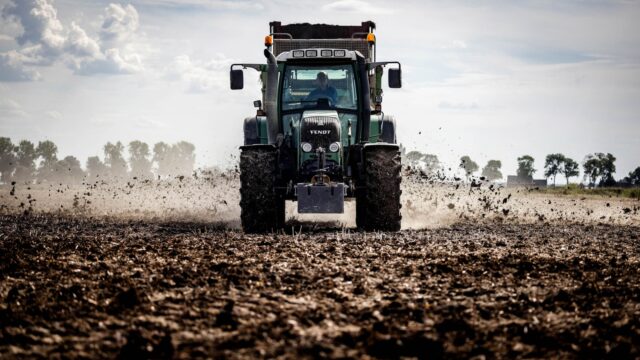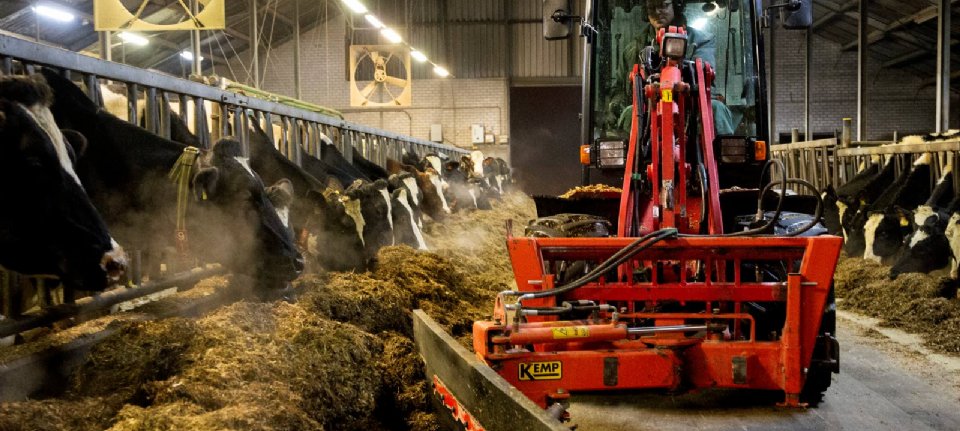The state of phosphates in the soil breaks down severely, with consequences for livestock. Veterinarians and counselors see phosphate-deficient cows more often. Animals suffer from milk fever, broken bones, paralysis, and their health is compromised.
“I’ve seen the extremes,” said Sirt Jan Boursema, a veterinarian at De Rijp Animal Clinic. “Cows that are deficient in phosphates mess with their health, such as lameness and milk fever, and sometimes have serious consequences such as runoff or death.”
According to Boersema, there is a clear association with strict fertilization standards. Since less phosphate ends up on the ground in recent years, along with a dry summer, phosphorous is less in the bran. In addition, the phosphorous content of concentrates has decreased due to environmental legislation. It is no longer self-evident that phosphorous levels are always sufficient. So you have to pay more attention to it.
milk production
Cows need phosphorous to stay healthy. They mainly use phosphorous for milk production. But if cows excrete more phosphorous through milk than through feed, a deficiency arises. “This limit has now been reached,” the vet confirms.
On farms where cows have vague complaints, Boersema often finds that the phosphorous content of bulk milk is less than 100.
whirlpool
Gerard Abbeck, a consultant at Groeikracht, also voiced his concerns. He finds that many livestock keepers are deficient in phosphate in their cycle. “Although we don’t have a complete picture and rations can be easily corrected, it doesn’t surprise us.”
Within four years, the phosphate content of Ashterhoek’s soil was reduced by 6 percent, Abbenk said. In the rough, too, the national trend has been in decline for years. For many plots, this is not a problem yet. But we are in a downward spiral. Where will we be in ten years?
Phosphate fertilizer
It will be especially urgent for the exclusion farms that have not been allowed to supply phosphate fertilizers since 2014. “The pit is getting bigger and bigger. Fear lives among farmers and consultants. According to Abenek, there are many situations where farmers do not get up to 30 kilograms of phosphates per hectare because their slurries contain little phosphate.
The disadvantage of hypophosphatemia is that animal health problems slowly creep into the herd. Cows are the first to use phosphorous from their bones. Older cows are the most sensitive.
bone fractures
Volkert Postma, veterinarian at the Wolvega Animal Clinic, noted this, too. On a dairy farm, he saw thirty cows removed within two years with broken bones and tendon injuries. The forage on this farm contained enough phosphate on the paper, but not enough attention was paid to the loss through high milk production.
Rarely do we see such a specific case with the removal of these numbers of animals. However, we see more cows with skeletal damage.
muscle weakness
On many farms, additional phosphorous is already added to the ration. So Postma does not immediately notice an increase in problems. It is often a commercial issue that requires immediate action. Cows become flat due to weak muscles in their bodies. But I certainly don’t want to underestimate the phosphate deficiency. We are really on the brink.
According to Appenk, the solution is simple: Allow farmers to fill the phosphate space with animal manure. They do not have to spend any capital on compost removal, which saves a lot of transportation and pressure on the compost market. Moreover, they do not have to waste money compensating for the deficiency of phosphate through phosphorus in the diet. In addition, it becomes unnecessary to provide more nitrogen fertilizer because of the nitrogen you remove via animal manure.
The Groekracht consultant believes that the current dung policy is flawed. “Unfortunately, the idea of recycling is hard to come by.”

“Total coffee specialist. Hardcore reader. Incurable music scholar. Web guru. Freelance troublemaker. Problem solver. Travel trailblazer.”







More Stories
Toward a sustainable future: space exploration as a driver of terrestrial sustainability
“There is no scientific evidence for strict fertilizer standards in the Netherlands.”
Astronomers have discovered a new molecule in space. And it's very special